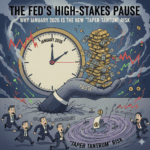Introduction
In this article, we explore the key triggers that have the potential to influence and drive a stock market rally in the near term. Understanding these factors is essential for investors and market participants to make informed decisions and capitalize on market opportunities. By analyzing market dynamics and identifying the critical catalysts, we can navigate the ever-changing landscape of the stock market more effectively.
Economic Indicators Pointing Towards a Rally
The stock market rally is often influenced by various economic indicators that provide valuable insights into the overall health and growth prospects of the economy. These indicators include:
1. GDP Growth Rate
The GDP growth rate serves as a crucial parameter for evaluating the strength of an economy. A higher GDP growth rate indicates robust economic performance, which can boost investor sentiment and drive the stock market upwards. By monitoring GDP growth figures, investors can gain valuable insights into the potential for a market rally.
2. Employment and Job Market
The state of the job market and employment levels can significantly impact the stock market. When employment rates are high and job opportunities abound, consumers have more disposable income, which leads to increased spending and drives corporate profits. Positive trends in employment can act as a catalyst for a stock market rally.
3. Inflation Rate
Inflation plays a critical role in determining the purchasing power of consumers and the profitability of businesses. A controlled and moderate inflation rate is generally favorable for the stock market, as it ensures price stability and supports sustainable economic growth. A lower inflation rate can boost investor confidence and contribute to a potential rally.
Market Sentiment and Investor Confidence
Apart from economic indicators, market sentiment and investor confidence play a vital role in dictating stock market movements. These factors can often override the influence of fundamental indicators and drive market trends. Understanding market sentiment requires a comprehensive analysis of the following:
1. Investor Psychology
Investor psychology refers to the collective emotions, biases, and behavioral patterns exhibited by market participants. Factors such as fear, greed, and risk aversion can significantly influence market sentiment. Analyzing investor psychology can help identify potential shifts in sentiment and anticipate market rallies.
2. Market Volatility
Market volatility, measured by indicators like the VIX (Volatility Index), reflects the magnitude and frequency of price fluctuations. High levels of volatility can create opportunities for traders and investors alike. By closely monitoring market volatility, one can identify periods of increased buying or selling pressure, potentially leading to a stock market rally.
3. News and Events
News and events, both global and domestic, can act as triggers for market rallies. Positive news such as favorable economic policies, corporate earnings surprises, or breakthrough innovations can instill optimism and drive investor confidence. Staying informed about relevant news and events is crucial to identifying potential catalysts for a stock market rally.
Technical Analysis and Trend Identification
Another approach to identifying potential triggers for a stock market rally involves technical analysis and trend identification. By examining historical price patterns, chart formations, and technical indicators, investors can uncover potential opportunities. Technical analysis allows market participants to identify trends and reversals, providing insights into potential rally points.
Conclusion
The stock market is influenced by a wide range of factors, and understanding the key triggers for a potential rally is essential for investors and market participants. Economic indicators, market sentiment, investor confidence, and technical analysis all play crucial roles in driving stock market movements. By monitoring these factors closely and conducting thorough analysis, investors can position themselves to take advantage of potential rallies and optimize their investment strategies.
Remember, success in the stock market requires continuous monitoring, adaptability, and a keen eye for emerging trends. By staying informed and employing a disciplined approach, investors can navigate the complexities of the stock market and increase their chances of capitalizing on market rallies.
















One thought on “Unleash the Potential: Key Triggers That Fuel a Stock Market Rally”